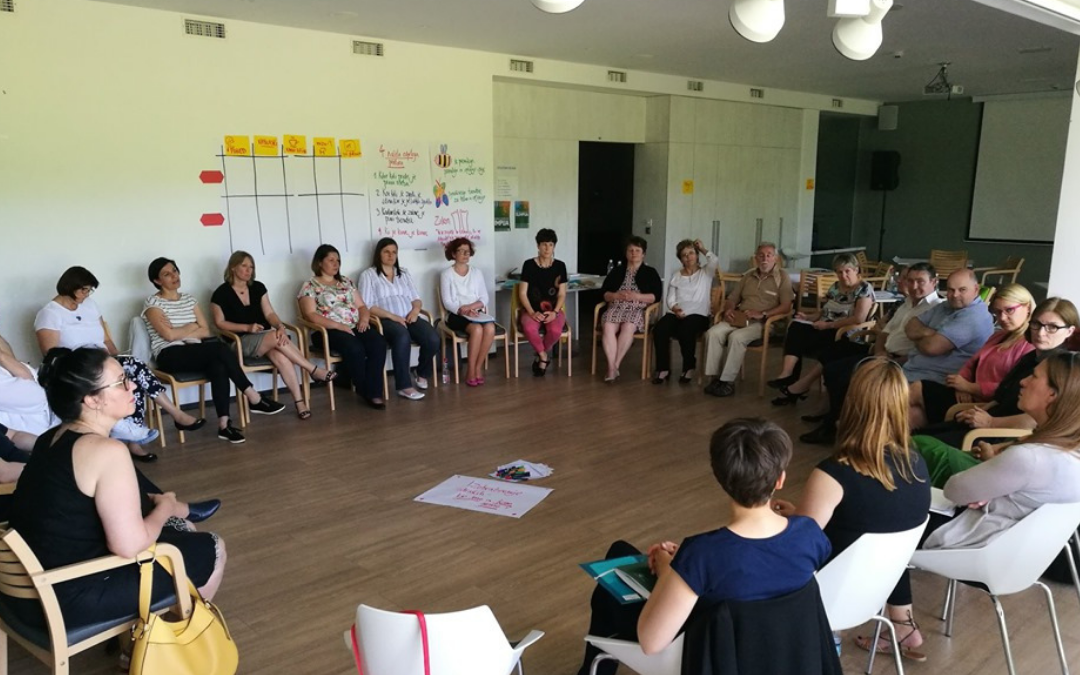The title is quite daring for the Slovenian Adult Education Association consultation. This question is posed by adult educators at a time when our society is celebrating its 50th anniversary and when a new AEMP, which will have to at least partially answer the question in the title, is being drawn up.
We sought for answers at a professional meeting organized in early June in Zalog, Ljubljana. With its flexible, unique layout, the meeting room itself created a relaxed atmosphere and invited participants to cooperate.
Adult educators: the members of societies, organizers, education providers, the SIAE professional workers, the Centre for Vocational Education, the University of Ljubljana, Faculty of Arts, theorists and practitioners, attended the consultation in large numbers.
The organisers have deliberately included in the programme contents, to which too little attention is paid in AE, although the future, including the future of education, will largely depend on them. It involves non-formal and informal education and learning, media influence, artificial intelligence, and new paradigms in adult education that require different skills and competences: decision-making, communication, interpersonal relationships, information technology, and knowledge on how to learn, etc. The consultation was conducted by Ida Srebotnik, President of the SAEA, and Natalija Vrhunc, Licensed Moderator.
The first part was devoted to preliminary reflections of the invited experts. Dr Zoran Jelenc, long-time President of the SAEA, presented the history of this field in Slovenia. He has made a decisive contribution to its 50 years of development.
Dr Ana Krajnc, who was awarded the Order of Merit for her contribution to in June by the President of the Republic of Slovenia, Borut Pahor, highlighted that the future is here and now. In doing so, she drew attention to new paradigms in AE. The UNESCO International Organization has significantly affected the development of adult education in Slovenia; therefore, we were interested in today’s priorities of the organization. The Vice-President of the UNESCO Commission for Slovenia, Dr Darko Štrajn, discussed the matter in more detail. Dr Jože Vogrinc from the Faculty of Arts, who is an expert in the field of media, spoke about the media, their advantages, disadvantages and the great influence they have today, especially on informal learning and information to individuals.
Dr Eva Boštjančič, also from the Faculty of Arts, had a very interesting contribution, namely, she compared different opinions on education from the point of view of employees and employers. Furthermore, we were all anxious to hear what Dr Jure Žabkar from the Institute of Artificial Intelligence, Faculty of Computer and Information Science at University of Ljubljana, would say about the impact of artificial intelligence on education. The knowledge on this will be highly important in the future. All the contributions were interesting and reiterated how broad and diverse the field of AE is and what further research will be needed.
- Slovenia is a learning country with many projects, events and efforts of individuals and groups, such as LLW, Third Age University, study circles, PLYA, Independent Learning Centres, etc.; however, political decision-makers should be more responsive in this respect.
- We should be more aware of the impact of the media, information and communication technology, artificial intelligence on informal learning, and take this into account in recognizing knowledge, skills and competences, and draw attention to the negative consequences in this respect.
- We should actually consider new ways of knowledge acquisition, also in the legislation.
- Funding of adult education is non-transparent and shamefully low. Budgets and interdepartmental cooperation in the draw up of the AEMP should be joint. Funds for the area’s development, new programs and projects should be increased.
- An incentive to introduce tax relief for supporters and promoters of adult education and for new knowledge and innovations within lifelong learning was proposed.
- Vulnerable groups should be offered practical and motivationally useful and interesting educational programmes through appropriate methods and forms of work that enable the co-creation of knowledge and the acquisition of necessary skills and competencies.
- We should raise awareness among managers of the capability of educated staff at work, and of the importance to provide good working conditions for the development and learning of most competent workers.
- It is necessary to understand, consider, acknowledge and develop new paradigms in adult education, i.e. ICT, new media, artificial intelligence, etc., and to discuss awareness-raising, and include key recommendations in the legislation.
The participants assessed the consultation as highly positive due to new content and welcomed the opportunity given in the second part when they could share their experiences, reflections, suggestions and solutions.
With different contents and providers, the vision of behaviour and the importance of adult education in the future, which was also the subtitle of this meeting organised by the SAEA, indicated the beginning, which should be continued and upgraded in the future with new, relevant contents and views on the education of modern man. Let me quote Dr Krajnc once again: The future is here and now!
Ida Srebotnik (drustvoio@gmail.com), SAEA






